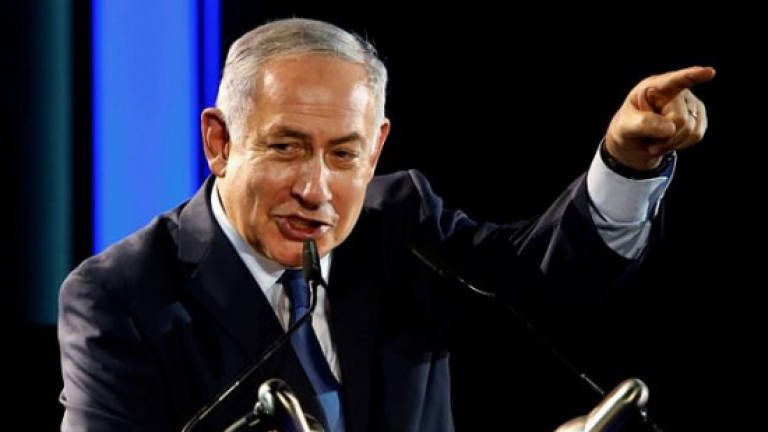For Israel, concern over Iran leads to better ties with Arab states

JERUSALEM: Israel has been promoting the idea that its ties with Arab countries are improving, and some experts say there are signs that shared concerns over Iran are indeed nudging them closer.
Formal recognition of Israel by Arab states does not seem likely anytime soon, but behind-the-scenes cooperation has opened up in various areas, a number of experts and officials say.
Significant rapprochement would constitute a departure from the decades-old policy of Arab countries refusing to deal with Israel until an independent Palestinian state is created.
But in the latest sign of mutual interests, both Israel and Saudi Arabia congratulated US President Donald Trump last week after his speech in which he declared he would not certify the 2015 Iran nuclear deal.
"I think there are two issues that the president was concerned with and we're all concerned with, and coincidentally on this, Israel and the leading Arab states see eye-to-eye," Israeli Prime Minister Benjamin Netanyahu said this week.
"When Israel and the main Arab countries see eye-to-eye, you should pay attention, because something important is happening."
Last month, Netanyahu described relations with the Arab world as the "best ever", though without providing any details.
Leaders of Arab countries have not publicly made similar comments, though that does not necessarily mean they dispute Netanyahu's claim.
They face sensitivities within their own countries, where the Jewish state is often viewed with intense hostility.
Since Israel was established in 1948, only two Arab states – Egypt and Jordan – have signed peace deals with the country.
But as the Middle East's most powerful military with respected intelligence capabilities and a close bond with the United States, Israel is potentially a key ally against Iran for Arab states.
Israel has long viewed Iran as its number one enemy, while Sunni Arab nations such as Saudi Arabia are regional rivals of the Shiite country.
"(Relations are still) under the radar and unofficial because the culture of the Middle East is sensitive" to this matter, Israeli Communications Minister Ayoub Kara, a Netanyahu ally, told AFP.
Trump's visit
Due to the concealed nature of any improved relations, pointing to exactly what Israel and Arab countries may be cooperating on is difficult.
Occasional examples have become public, such as when Israel announced in 2015 it would open a mission in Abu Dhabi as part of an international green energy body – its first official presence in the United Arab Emirates.
Israeli public radio reported last month that a Saudi prince visited the country secretly and met with Israeli officials about regional peace. The visit was never confirmed.
Uzi Rabi, a Tel Aviv University professor who specialises in Saudi Arabia, said there seemed to be "coordination" on issues including seeking to limit the spread of Iranian influence in the region.
It may also include cyber-security coordination, he said.
"There are Saudis meeting Israelis everywhere now, functioning relations based on shared interests," Rabi said.
The United States has also sought to promote links between Israel and the Arab world, with Trump's administration hoping to leverage regional interests to reach an Israeli-Palestinian peace deal.
Trump visited the Middle East in May, travelling from Saudi Arabia to Israel in a rare direct flight between the two countries.
"There is tremendous will, really good feeling, towards Israel," Trump said of Saudi Arabia upon arrival in Israel.
"What's happened with Iran has brought many other parts of the Middle East towards Israel."
But even if ties are warming, many analysts question whether major steps are possible without a peace deal that would end Israel's 50-year occupation of Palestinian territory.
Outside in
Israeli relations with Gulf Arab states are not totally new.
In the 1980s, for example, Saudi billionaire arms dealer Adnan al-Khashoggi, a key player in the region, was said to have had a relationship with then-defence minister Ariel Sharon, said Gil Merom, a specialist in political relations at the University of Sydney.
But the ties seem to have become less covert.
For years, politicians have discussed the so-called "inside out" theory, whereby Gulf Arab states would recognise Israel in exchange for the creation of an independent Palestinian state.
This was the basis of a 2002 Saudi-led peace plan which was never implemented.
But increasingly Israeli officials talk about the "outside in" idea – Arab states recognising Israel ahead of potential Palestinian independence.
There is no sign Arab states would go along with any such plan.
Kristian Ulrichsen, a professor focused on Gulf affairs at Rice University in the United States, said the basis of ties between Israel and Arab countries was common enemies.
"For several of the Sunni Arab states in the region, particularly in the Gulf, there is a growing sense that the major contemporary faultlines in the region now revolve around the perceived threat from Iran and militant Islamism," he said.
"And on both these issues there is a certain convergence of interest with Israel," he told AFP. "I do expect economic and security ties to become more open in the months and years ahead." — AFP